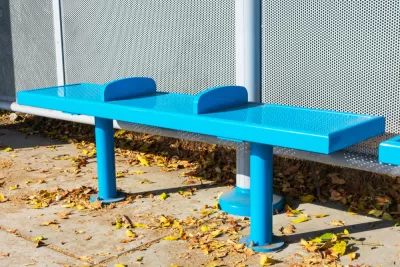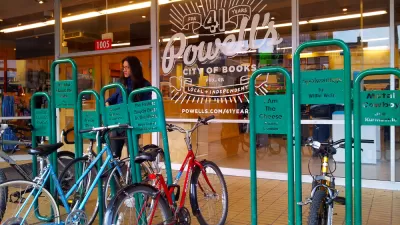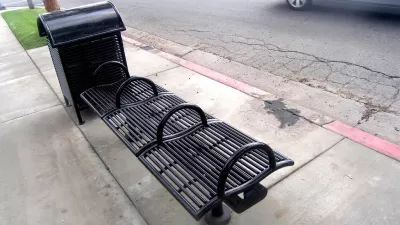‘Defensive urbanism’ interventions explicitly seek to repel certain, often vulnerable, social groups from public spaces.

In an article for Canadian Architect, Pamela Young highlights the work of Cara Chellew, a researcher who documents “hostile design,” defined as “urban interventions that restrict behaviour, defending spaces against unwanted occupation by skateboarders and unhoused people.”
Based on the work of British artist Stuart Semple, the concept of “hostile design,” also known as defensive urbanism, calls attention to the elements of urban design that aim to make ostensibly public space unwelcoming to certain populations. Chellew’s research maps defensive urbanism examples in Toronto. In addition to physical elements that aim to repel “loiterers,” Chellew also includes “ghost amenities” that no longer exist: “Permanently out-of-service drinking fountains, locked or non-existent park washrooms, and ‘shade structures’ that filter sunlight but let rain flood through all have an impact on how shared outdoor space can be used—and who uses it.”
Researchers like Chellew and Nadia Galati, a principal at PROCESS, argue that designing cities for the most vulnerable groups creates more accessible and pleasant public spaces for everyone. Galati recommends implementing a paid community engagement process for new parks and public space projects, whereby residents are paid for their participation in order to attract more input from underrepresented groups.
FULL STORY: Don’t Get Defensive

Maui's Vacation Rental Debate Turns Ugly
Verbal attacks, misinformation campaigns and fistfights plague a high-stakes debate to convert thousands of vacation rentals into long-term housing.

Planetizen Federal Action Tracker
A weekly monitor of how Trump’s orders and actions are impacting planners and planning in America.

In Urban Planning, AI Prompting Could be the New Design Thinking
Creativity has long been key to great urban design. What if we see AI as our new creative partner?

King County Supportive Housing Program Offers Hope for Unhoused Residents
The county is taking a ‘Housing First’ approach that prioritizes getting people into housing, then offering wraparound supportive services.

Researchers Use AI to Get Clearer Picture of US Housing
Analysts are using artificial intelligence to supercharge their research by allowing them to comb through data faster. Though these AI tools can be error prone, they save time and housing researchers are optimistic about the future.

Making Shared Micromobility More Inclusive
Cities and shared mobility system operators can do more to include people with disabilities in planning and operations, per a new report.
Urban Design for Planners 1: Software Tools
This six-course series explores essential urban design concepts using open source software and equips planners with the tools they need to participate fully in the urban design process.
Planning for Universal Design
Learn the tools for implementing Universal Design in planning regulations.
planning NEXT
Appalachian Highlands Housing Partners
Mpact (founded as Rail~Volution)
City of Camden Redevelopment Agency
City of Astoria
City of Portland
City of Laramie





























